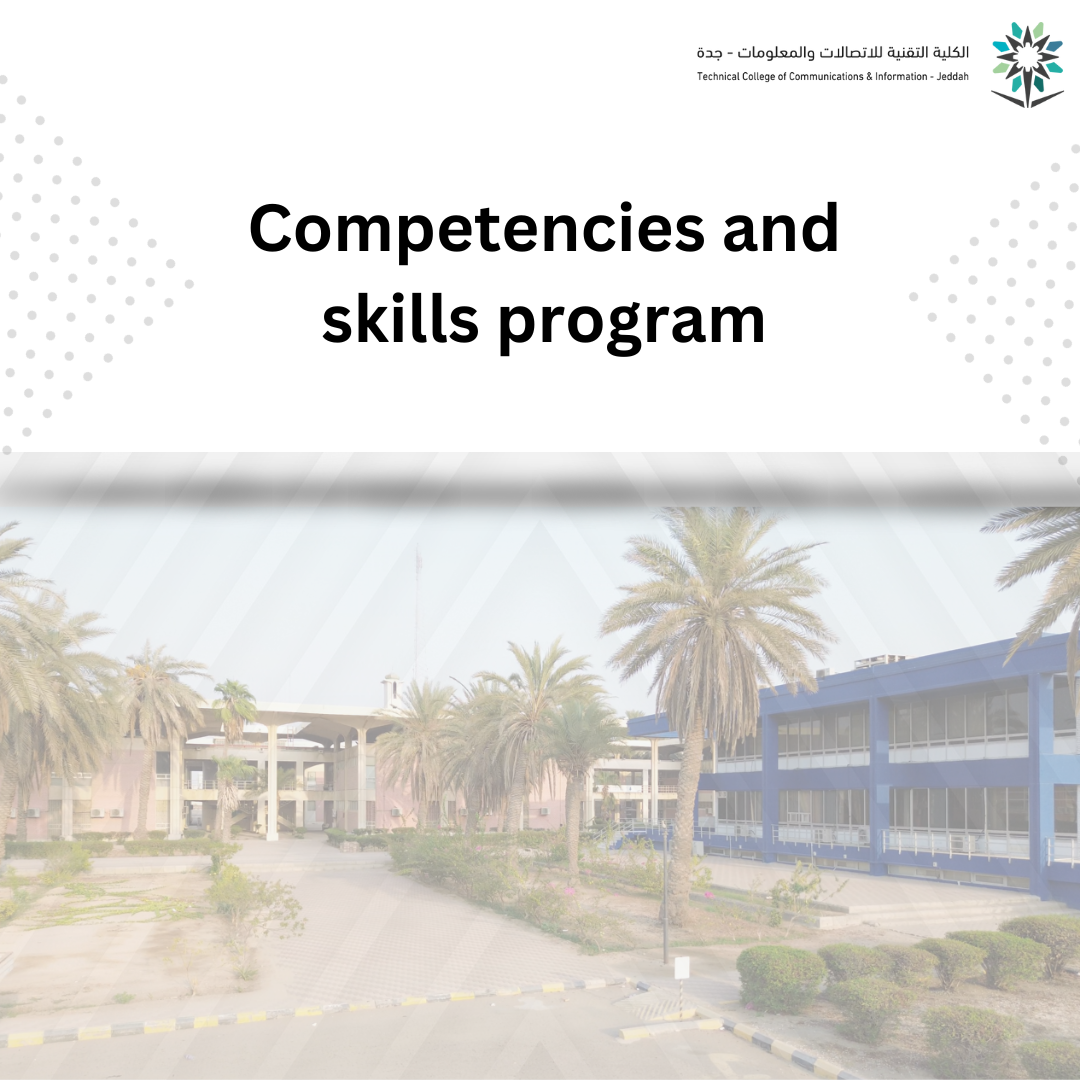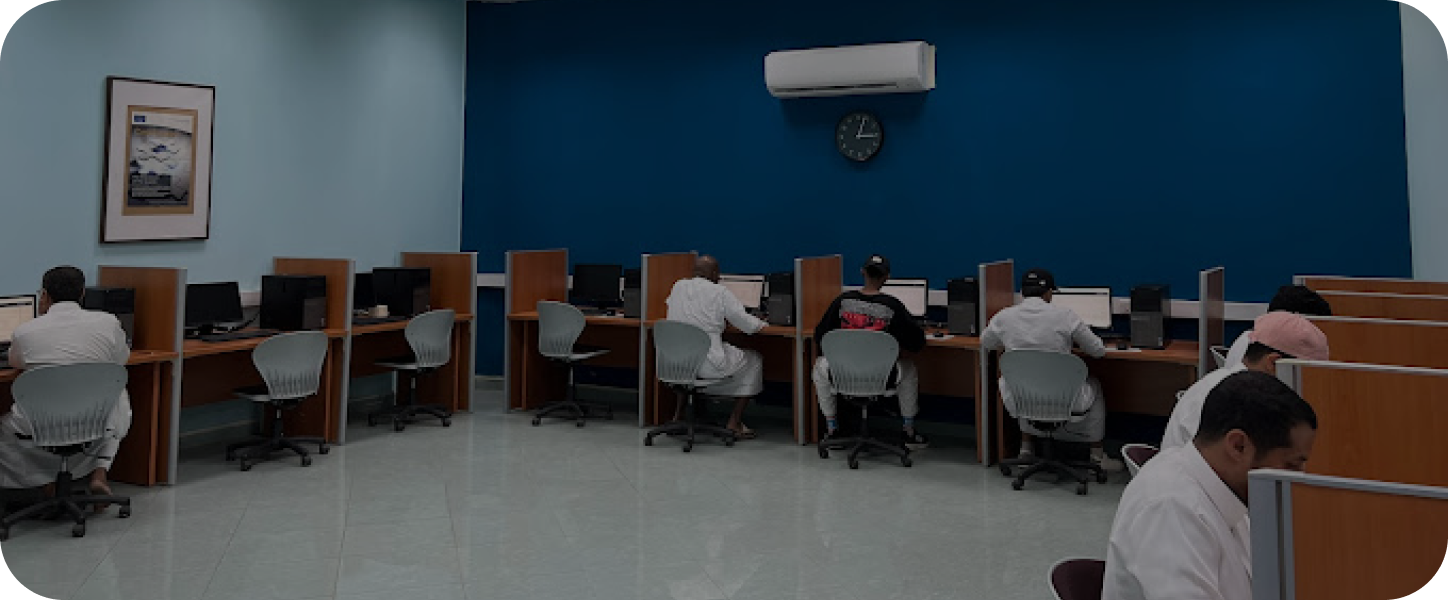Competencies and skills program
This program aims to develop the skills of trainees and build their capabilities in a variety of fields. The College’s Abilities and Skills Program includes a range of activities and training courses that cover diverse areas and help trainees enhance their opportunities in the job market. The program also empowers trainees and equips them with the skills they need to excel in their studies and their future career paths.

Record Personal Skills

Courses

time management
- Monday-Tuesday-Wednesday
- 7-9 a.m. (Course duration: one hour)
- Development Center Building - Building No. 10
- Maximum number of attendees: 20 trainees
Course Summary: Time is a valuable and unique resource, and it is given equally to every person, regardless of their age or location, as mentioned in the saying, “Many people do not realize that time has passed until their life has passed. Begin now to learn the skills of time management efficiently and effectively through this training course, which will help you set goals and priorities in your life and understand what is required to make the most of your time.
- Time analysis
- Planning
- Organization
- Execution
- Dealing with time wasters
- How to gain time
- Follow-up

Preparing the trainee for the job market.
- Monday-Tuesday-Wednesday
- 7-9 a.m. (Course duration: one hour)
- Development Center Building - Building No. 10
- Maximum number of attendees: 20 trainees
Course Summary: Developing trainees’ skills to face the challenges of the job market, starting from job searching to securing good job opportunities.
- Job search mistakes
- Resume building mistakes
- Mistakes during the personal interview

Writing Administrative Reports and Correspondence
- Monday-Tuesday-Wednesday
- 7-9 a.m. (Course duration: one hour)
- Development Center Building - Building No. 10
- Maximum number of attendees: 20 trainees
Summary of the Course: Writing reports is of great importance in our professional life in general, and in the administrative field in particular, for several reasons, most importantly, that the administrative report is considered a source of information as well as a monitoring and evaluation tool for activities, indicating developments. Therefore, there are conditions that must be met in the report, including brevity and accuracy, clarity, logical sequence of ideas, credibility, and persuasion. Some may find it difficult to write good reports, especially at the beginning of their professional life. This training program will highlight the most important principles and rules that should be followed in report writing. It covers the essential components of a successful report and the characteristics of a good report. It also discusses the key elements that need to be present in a report in terms of information, presentation style, and integration to ensure that the report fulfills its intended purpose. The program uses examples to emphasize the importance of the information in the report and how the content is presented. It also addresses common errors in preparing and writing reports. Finally, the program assesses the level of benefit obtained by requesting participants to prepare some reports and reviewing them to identify positive and negative aspects. It also covers how to enhance and develop these reports to achieve their intended purpose.
- Understanding modern concepts of reports and correspondences.
- Training on different types of reports.
- Recognizing the necessary conditions for a report.
- Training on the components of a report.
- Learning the steps for report writing (stages of report preparation).
- Understanding the contents of reports.
- Practicing methods of narrating and organizing reports.
- Identifying common mistakes in reports and ways to avoid them.
- Practicing the use of Kaizen in report writing.
- Training on using illustrative methods in report preparation.
- Each participant prepares a report, and these reports are reviewed to identify positive and negative aspects and how to improve them.

Entrepreneurship
- Monday-Tuesday-Wednesday
- 7-9 a.m. (Course duration: one hour)
- Development Center Building - Building No. 10
- Maximum number of attendees: 20 trainees
Course Summary: This course provides an understanding of entrepreneurship, covering topics such as entrepreneurial skills, sources of ideas, how to evaluate them, and examples of innovative businesses and how to design your business model. You will also learn about creating and managing companies, stages of business growth, financing sources and operations, and building an optimal team. Additionally, you’ll explore market research, competitive analysis, and the key factors for small business success.
- Key challenges faced by small enterprises.
- Internal factors influencing the success or failure of small enterprises.
- External factors affecting small enterprises.
- Success indicators for small businesses.
- How an individual can become a successful entrepreneur.

The art of writing a CV
- Monday-Tuesday-Wednesday
- 7-9 a.m. (Course duration: one hour)
- Development Center Building - Building No. 10
- Maximum number of attendees: 20 trainees
Course Summary: This course provides training on writing an effective resume. Participants will learn what to include in their resumes, be guided on best practices for resume writing, and gain insights into common resume writing mistakes.
- The importance of a resume.
- Guidelines for writing a resume.
- Exercises for writing a resume.
- Common mistakes in resume writing.
- Key points for writing a resume.